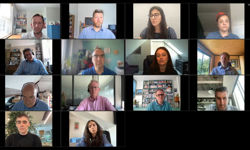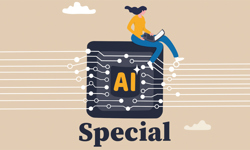
Artificial intelligence is all anyone wants to talk about.
Its impact will be huge on all walks of life. It will power medical breakthroughs, provide us with time-saving efficiency tools, do many people out of a job, expose us to greater online threats and potentially destroy us all.
It’s being described as an existential threat to the planet with the same destructive potential as nuclear weapons.
Just how safe are the nuclear launch codes?
Regulation is needed and senior figures from within the world of AI have even called for a pause on development. The former will happen, but don’t hold your breath, the latter will never. And, even if the “good guys” paused, the bad ones certainly wouldn’t.
So, what about publishing? What impact will AI have on our sector?
- Workflows: AI will help us to streamline and further automate our workflows, saving us time and reducing errors. This should lead to better outputs, unless senior managers use it simply as an excuse to get rid of experienced and knowledgeable staff.
- Marketing: AI will enable us to better personalise and automate our marketing communications, resulting in higher conversion rates and better RoI on marketing spend.
- Content creation: for factual data reporting (weather, financial, sports etc), AI will be able to compile more quickly and accurately large amounts of publishable content.
- Research support for journalists: for journalists doing in-depth research on a subject, platforms like ChatGPT can help with sense-checking and providing the journalist with angles they might not have considered.
On this last point, crucially, journalists must never fall into the trap of getting ChatGPT to actually write their piece, just to help with researching it. Apart from the ethical no-no of passing off someone else’s work as your own, the fact is that articles written by ChatGPT are INCREDIBLY DULL.
They are technically proficient and wide-ranging, but are totally lacking in character, wit, nuance and are untethered to the here and now, based as they are on learnings derived from previously published material. They are competent yet somehow semi-detached from the subject matter.
On one level at least, the tsunamic of woeful AI-generated content already being produced by unscrupulous “publishers” is a huge opportunity for proper professional publishers. Our humanity is our differentiator.
As for the nuclear launch codes, I do hope someone somewhere is working night and day to securely ring fence those.
(In the upcoming May / June issue of InPublishing magazine (you can register to receive it here), Dickon Ross provides two versions of his regular column, one written by himself, one by ChatGPT. You can compare and contrast. It’s an eye-opener.)
You can catch James Evelegh’s regular column in the InPubWeekly newsletter, which you can register to receive here.










